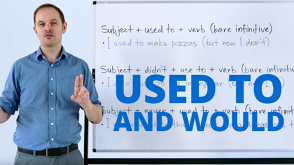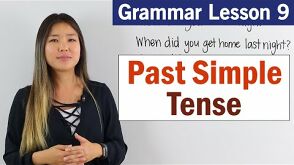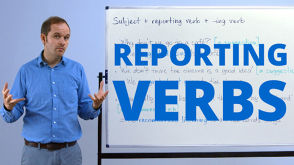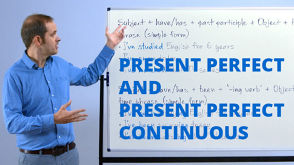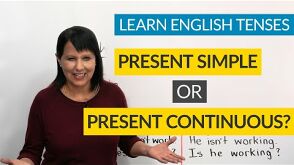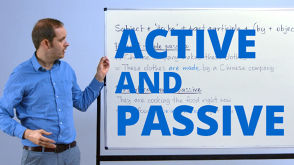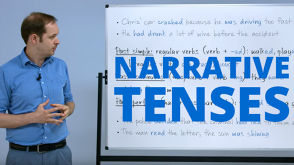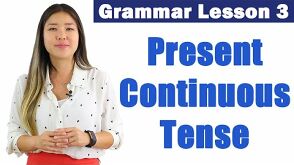Learn real English from movies and books.
Add words or phrases for learning and practice with other learners.
-
STEP 1Watch the video

-
STEP 2Do the exercises

-
STEP 3Add phrases you like to Favorites

Reported speech
- 00:00 / 00:00
Click on a word or highlight a phrase to see translation
Click on a word or highlight a phrase to see translation
Click "plus" to add word/phrase for learning
Click "plus" to add word/phrase for learning
Start learning
Start learning
Reported speech
When we want to describe to someone what someone else said to us at some point in time, we use reported speech. Reported speech can be used to transfer messages in most tenses in English from, what is called, direct speech to indirect or reported speech. The reporting structures can be quite different from the original, direct speech because of something called ‘backshift'. ‘Backshift' changes the tense of direct speech by going one step backwards, present simple to past simple, for example. Reported speech structures use the verbs say, tell and ask.
Reported speech- Say and tell
The meaning of say and tell in reported speech is more or less the same, the structures, as we can see below, are different. In all cases of using say and tell, direct speech is being reported to someone else.
Reported speech ‘Say' form
Subject + said/says + (that) + direct/original structure with ‘backshift'
|
Direct speech |
Indirect/reported speech |
Explanation |
|
I always watch TV on Fridays' |
He said that he always watches TV on Fridays
|
In this case, backshift has not been used because the statement in the direct speech was true when the original speaker said it and is still true now |
|
‘I'm going to see my friends' |
She said that she was going to see her friends |
In this case backshift has been used. ‘is going to' becomes ‘was going to' because when the direct speech was spoken, it (the activity described) was true but now it is not |
|
‘I've seen a mouse' |
He said he had seen a mouse |
Here backshift has been conventionally used so the sentence ‘jumps' from present perfect simple to past perfect simple. Also, ‘that' has been removed to save time. |
| ‘I saw your car keys in your jacket' |
She said she had seen his car keys in his jacket |
Again, ‘that' has been removed by the speaker and backshift has also been used because we are reporting the direct speech, and the events described in the direct speech might not be true anymore. |
Reported speech ‘Tell' form
Subject + told/tells + object + (that) + direct/original structure with ‘backshift'
|
Direct speech |
Indirect/reported speech |
Explanation |
|
‘I can't swim very well' |
He told me that he couldn't swim very well
|
Similar to the ‘say' reporting structures, backshift is used when the direct speech events are not definitely still true. In this ‘can't' becomes ‘couldn't' |
|
‘We might be late because of the traffic' |
They told us that they might be late because of the traffic |
With the modal verb ‘might' backshift is not possible so the reported speech structure looks very similar to the original direct one |
|
‘I must go to the shop' |
She told him she had to go to the shop |
When we want to use must in reported speech with backshift, it needs to be changed into ‘had to'. You can also see that the ‘that' has been removed to save time. |
A speaker of English can choose to use ‘say' or ‘tell' in reported speech and not worry about the difference in meaning but it is important to remember the differences in structure:
He said that he was sorry NOT He said me that he was sorry
He told me that he had been busy NOT He told that he had been busy
Backshift
It can be confusing for users of English to decide when to use backshift. Backshift can be used all the time and is not required when the information given in direct speech is still true or always true:
‘My name is Charlie' = He told me his name is Charlie (this information is always true so doesn't need to be changed)
Reported speech- Yes/No questions
When we want to report questions when the answer is either ‘yes' or ‘no', the structure of the direct speech is changes quite a lot in reported speech. The verb ‘ask' is used with ‘if'.
Yes/No Questions form in reported speech
Subject + asked + object + if + reporting structure of question
|
Direct speech |
Indirect/reported speech |
Explanation |
|
‘Do you like dance music?' |
He asked me if I like dance music
|
The reported speech does not use ‘backshift' as the information in direct speech is true. |
|
‘Can you cook like that?' |
She asked me if I could cook like that |
‘Can' becomes ‘could' because of backshift and because it is a ‘Yes/No' question ‘if' is used. |
|
‘Is it good or bad?' |
He asked me if it was good or bad |
Backshift is used here with if again as the ‘Yes/No question' is reported conventionally |
Reported speech- ‘Wh-‘and ‘How' questions
With more complex questions, reported speech alters the direct speech in other ways. With these kinds of questions, the word order in the reported question is altered.
Wh-/How questions form in reported speech
Subject + asked + object + reporting structure of question
|
Direct speech |
Indirect/reported speech |
Explanation |
|
‘What time is it?' |
He asked me what time it was
|
We can see with the reported question that backshift has been used and the verb is moved to the end of the sentence in the reported form |
|
‘How often do you eat meat?' |
They asked me how often I ate meat |
The auxiliary verb ‘do' in direct speech is removed in reported speech but the other words stay in the usual order |
Similar video exercises
Click on a word or highlight a phrase to see translation
Click on a word or highlight a phrase to see translation
Click "plus" to add word/phrase for learning
Click "plus" to add word/phrase for learning



